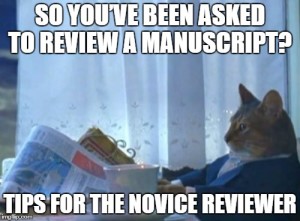Any scientist who is trying to publish relies upon the generosity of other scientists to peer-review their work. As any scientist will tell you, this has pros and cons – constructive advice can greatly improve a manuscript and fix flaws, but on the cons side every scientist has stories about the infamous “reviewer #3” who makes every scientist’s life hell at some time or other. As you start to build a name for yourself, you’ll be asked to review manuscripts, and you should! Reviewing manuscripts is an essential task for any academic and is an integral part of academic life – it is basically an obligation. But there is generally no class on “how to review manuscripts” despite it being a critical part of an academic’s job, and the reviewer has a huge responsibility: your review could potentially make, or seriously hamper, someone’s career. Moreover, doing a poor job reviewing could let bad, unscientific research get published, or even prevent important research getting accepted. To help navigate the minefield of reviewing, here are some tips and suggestions for the novice reviewer…
Read More “So you’ve been asked to review a manuscript? – Tips for the novice reviewer” »
